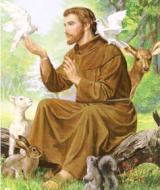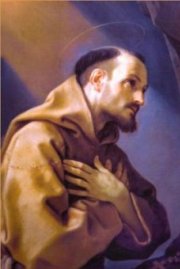

VATICAN CITY (CNS) -- For St. Francis of Assisi, following Christ meant imitating his humility and forsaking riches, power and status; the men who call themselves Franciscans today believe they are called to embrace the same attitudes, including in their governance. In early April, the ministers general of four men's branches of the Franciscan family -- the Friars Minor, Capuchins, Conventual Franciscans and the Third Order Regulars -- asked Pope Francis to give the Franciscans the "privilege" of allowing religious brothers to be elected to leadership positions, including those with authority over ordained priests. The word "privilege" means special permission for something not generally envisioned by church law. In canon law, governance in the church usually is tied to ordination. The Franciscans' request is about recovering the notion of fraternity and service St. Francis gave his first companions, said Father Michael Perry, minister general of the Friars Minor. But it also has implications for leadership, authority and governance in the wider church. At its root, it raises the question: "Is leadership about organizing things in such a way that one has absolute control over everything? Or is leadership about empowering people so that there's a synergy, a bringing together of all the strengths within a community?" Father Perry told Catholic News Service. The core identity of ordained ministry is involved as well. Because of its unique connection to the Eucharist, the ministerial priesthood has a special and irreplaceable role within the Catholic Church and within a Catholic religious community, Father Perry said. The Franciscans' request "is not a question of challenging spiritual authority or the role of the shepherd; it's actually about liberating the shepherd so that he can be focused on the sheep and not have to be worried about the gates and the fences." The Franciscan ideal for leadership is that it should invite and challenge the friars -- brothers among themselves, whether ordained or not -- "to 'minority,' to not going up, but going down," Father Perry said. Minority is the opposite of clericalism, which is "a drive upwards as if upward mobility offered something, some security and guarantee of fidelity, a way of controlling people so they remain faithful to the truth. Franciscans, we don't see it this way." From 1208 to 1209 when Pope Innocent III approved St. Francis' initial rule for his order and up until 1239, Father Perry said, the Franciscans were allowed to elect brothers to leadership roles, including as minister general, and they did so. Massimo Faggioli, a church historian and professor of theology at Villanova University, said that if Pope Francis grants the friars' request, "it would signal to the whole church a shift in the sense of a de-clericalization of the religious orders and the return to the original inspiration of the founders: Francis was not a priest but a lay person, and the clericalization of the Franciscans came later." Some people have argued that St. Francis was a deacon, but Father Perry said even that is hotly debated among Franciscan scholars. What is certain is that he received the "tonsure," a ritual cutting of hair that often signified preparation for ordination. But Father Perry is convinced that in St. Francis' case, it was simply the official sign that he had been granted permission by the bishop to preach in churches. Loosening the link between ordination and governance increases the possibilities for recognizing the dignity, gifts, skills and call to service of all the baptized, Father Perry said. Reserving most leadership roles to the ordained, he said, "has not permitted space for women and also, at times, squelched competence. It has not promoted competence and, in fact, has awarded incompetence." A model of church leadership in which the ordained are spiritual shepherds, who also have oversight to ensure administrative and financial matters are handled appropriately, is "a different model than one in which leadership controls, that has to make sure 'I'm in charge.' That comes from personal insecurity and a lack of faith, not from the presence of faith," Father Perry said. In his view, he said, "clericalism is a sign of a lack of faith, a lack of trust -- a lack of trust in God, a lack of trust in others and, ultimately, a lack of trust in oneself." Faggioli, the church historian, told CNS that "the clergy-centered church was part of the tight relationship between church and state in the Western world of established Christendom. It was more a social and political necessity than a theological one: the state or the political authority needed to count on a reliable professional class of clergy faithful to the political authority." But the world has changed, he said, and "the church's mission in this secularized world needs all the hands, not only the clerical ones." While "governance is still canonically tied to ordination," the professor said, "in the real life of the Catholic Church worldwide today many key decisions are made by laypeople: Catholic education, health care, media, social work, etc. are largely in the hands of laypeople." "We have to come to terms with what is the nature of church and what is the nature of ministries in the church?" Father Perry said. "Francis of Assisi called for a new model, a model that would not challenge at all the nature of the church and the distinct roles within the church, but would remind the church that these are all in service to something higher, something greater."



|
Date |
Name of the Friars |
Events |
Year |
|
01 |
Charles Mathew Kolanchery |
Birth |
1947 |
|
02 |
Joseph Raj M. |
Birth |
1975 |
| 03 | Bl. Helene Enselmini, OSC | 1242 |
|
|
04 |
St. Charles Borromeo, OFS Bl. Teresa Manganiello, OFS Charles Bernard |
Birth |
1584 1876 1963 |
|
05 |
Lawrence Simon Bala Marneni + Thomas Thannikary + Bernard D’ Silva |
Birth Birth Home Home |
1949 1962 1996 2010 |
|
06 |
Bl. Marguerite deLorraine, OSC Singarayar A. Salvador D’Souza |
Birth Birth |
1521 1970 1979 |
|
07 |
St. Didacus of Alcala, OFM Bl. Raynier of Arezzo, OFM Hemant Xess |
Birth |
1463 304 1975 |
| 08 | Bl. John Duns Scouts OFM | 1308; |
|
|
09 |
Bl. Gabriel Ferreti, OFM Saji P. Mathew |
Birth |
1456 1975 |
|
10 |
Bl. Louis Guanella, OFS Augustine Pinto + Wilbert Smit |
Birth Home |
1340 1936 2003 |
|
11 |
Bl. Mary Crucifixa, OFS Fulgence Ekka Basil S. Lobo |
Birth Birth |
1826 1964 1971 |
| 12 | Bl. Giovanni della Pace, OFS | 1433 |
|
| 13 | St. Didace d’ Alcala, OFM | 1463 |
|
|
14 |
Franciscan Martyrs of Palestine + Mark O’Rourke Salvador Drego |
Home Birth |
1391 1974 1984 |
|
15 |
Bl. Sebastian de Jesus OFM Bl. Mary of the Passion FMM + Anthony Almeida |
Memoria Home |
1734 1904 1970 |
|
17 |
St. Elizabeth of Hungary Patroness of the OFS Bl. Jeanne de Signa, OFS |
|
1231 1307 |
|
18 |
Bl. Salome of Cracow, OFS |
|
1268 |
|
19 |
St. Agnes of Assisi, OSC Bl. Maria Milagros, OSC Thomas Joseph +Kamal Ekka |
Birth Home |
1253 1936 1962 2008 |
|
20 |
Franciscan Martyrs of Spain Irudayaraj Fernando + Bonaventure Davis + Bishop Ambrose Y +Jesu Irudayam |
Birth Home Home Home |
1936 1966 1971 1997 2009 |
|
22 |
Franciscan Martyrs of Armenia +Joachim Tinneny |
|
1895 2009 |
|
23 |
Bl. Marie de Jesus, Third Order Regular + John C. O’Dowda Maria Ratheesh Jenive |
Home Birth |
1902 1982 1999 |
|
24 |
Bl. Timothy Trajonowski, Conv Rajesh Praveen Kumar |
Birth |
1942 1994 |
|
25 |
All Deceased of the Seraphic Order St. Humilis of Bisgnano, OFM Bl. Elizabeth of Reute, Third Order Regular Carlos Dias Tojy M. |
Birth Birth |
1637 1420 1959 1970 |
|
26 |
St. Leonard of Port Maurice, OFM Balthazar Pinto |
Feast Birth |
1751 1960 |
|
27 |
St. Francis Anthony Fasani, Conv Johnson M. V. |
Feast Birth |
1742 1969 |
| 28 | St. Jams of La Marca, OFM | Feast | 1476 |
|
29 |
All Saints of the Seraphic Order Dependent Custody Foundation,North East. Amaladass Manickam |
Feast Erection Ordination |
2008 1985 |
|
30 |
Bl. Antoine Bonfandini, OFM Prasad Papabathuni |
Birth |
1482 1970 |